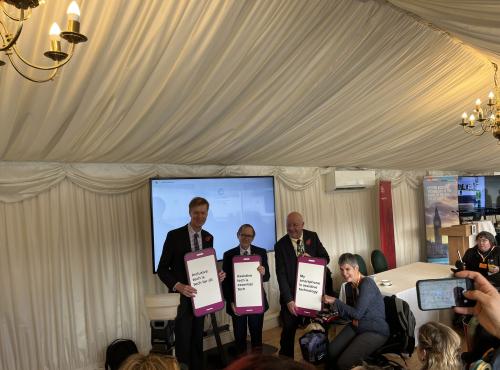APSRG hosts panel on Brexit and Sustainable Resource Policy at RWM in Birmingham
On Thursday, 15th September, the All-Part Parliamentary Sustainable Resource Group (APSRG) was proud to host a public conversation with leading Parliamentarians and the Deputy Leader of the Green Party on sustainable resource policy after Brexit at RWM in Birmingham.
The panel discussion aimed to tackle some of the biggest and most urgent questions facing the sustainable resource and waste industry as a result of Brexit. The speakers Mary Creagh MP, Chair of the Environmental Audit Committee (EAC), Dr Alan Whitehead MP, co-chair of the APSRG, and Amelia Womack, Deputy Leader of the Green Party, explored how Brexit will impact the future of resource, energy and environment policy in the UK.
Dr Alan Whitehead MP began the panel by pointing out that there are four dangers for waste and resource policy as a result of the EU referendum outcome. According to Dr Whitehead, these relate to investment uncertainty and development inertia in the transition from a waste economy to a sustainable resource economy and the risk of penalties for non-compliance ceasing to exist following Brexit as a high portion of waste legislation stems from European Directives. The former Shadow Minister for Energy also highlighted concerns that whilst the EU Circular Economy Package reaches its completion at EU level, the UK will no longer be part of the Union, resulting in being in “no-man’s land as far as what it is we do next and as far as strategy is concerned”. Dr Whitehead also questioned whether the UK’s current practices of exporting increasing tonnages of Refused Derived Fuel (RDF) will continue to be success after Brexit, and if the industry would be able to positively absorb these changes without new policy developments.
Mary Creagh MP outlined that environmental regulations could be the “most affected” areas of law impacted by Brexit. Ms Creagh has led many inquiries in her chairmanship of the EAC, having recently questioned the Government’s environmental policy, and vocalised concern that Government had yet to formulate a strategy for the environment in light of Brexit. Ms Creagh added that many targets and requirements existing in the UK are driven by EU Directives, including the Landfill and Waste Framework Directive. Ms Creagh agreed with Dr Whitehead MP that without the obligation to meet the targets set out in these Directives the UK could in effect have “zombie legislation” with no potential legal recourse from Europe if targets are not met. Finally Ms Creagh also highlighted the need for further policy direction around waste exports, in particular on RDF, if the UK does not remain a member of the European Single Market as this may impact RDF exporting businesses in the UK.
Deputy Leader of the Green Party, Amelia Womack, also praised the ambitious waste and resource policy that has come out of Brussels, but emphasised that whilst the UK could fall behind the rest of Europe on waste policy following Brexit, the disruptive politics we are currently experiencing could also provide opportunities to push forward. The UK is at a tipping point, so Ms Womack argued strongly that “we need to make sure that we secure ambition”, “challenge the legislation and maintain the standards we’ve seen in the EU”. Ms Womack also took this opportunity to highlight the differences in waste policy already visible in the UK, with Wales and Scotland notably embracing the circular economy, and challenging business and legislation into a more sustainable future. With the changes to the new Department for Business, Energy and Industrial Strategy (BEIS), it will be vital for this Department to embrace that waste and resource policy plays an important role in the wider economy.




